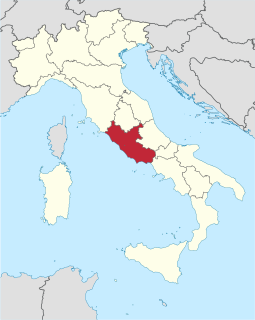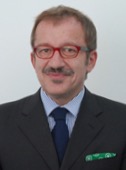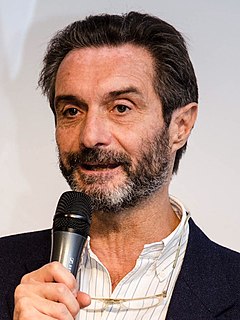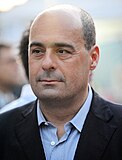Lazio regional election, 2013
|
|
All 50 seats to the Regional Council of Lazio |
|---|
|
 Composition of the Regional Council |
|
The Lazio regional election of 2013 took place in Lazio, Italy, on 24–25 February 2013.

Lazio is one of the 20 administrative regions of Italy. Situated in the central peninsular section of the country, it has almost 5.9 million inhabitants – making it the second most populated region of Italy – and its GDP of more than 170 billion euros per annum means that it has the nation's second largest regional economy. The capital of Lazio is Rome, which is also Italy's capital and the country's largest city.
Renata Polverini of the People of Freedom (PdL), who was elected President in 2010, was toppled by an expense scandal in October 2012 which led to her resignation.

Renata Polverini is an Italian politician and trade unionist. She was President of the Lazio region and was formerly Secretary General of the General Labour Union (UGL); she resigned on 24 September 2012 after an expense scandal.
After that, the candidate of Democratic Party (Italy) (PD) seemed a shoo-in for victory. In December 2012, the Commissioner of the Province of Rome, Nicola Zingaretti, decided to run as Governor of Lazio for 2013 regional election. As Lazio had been a traditional stronghold of National Alliance party, the former president Francesco Storace, segretary of the national-conservative party The Right and supported by Silvio Berlusconi's coalition, was chosen for the center-right coalition.

The Democratic Party is a social-democratic political party in Italy. The party's secretary is Nicola Zingaretti, who was elected in March 2019, while Paolo Gentiloni serves as president.

Nicola Zingaretti is an Italian politician who has served as President of Lazio since 2013. In March 2019, he was elected as Secretary of the Democratic Party.
The other candidates were Davide Barillari (M5S), who received the 20% of the votes, Giulia Bongiorno (Civic Choice) and Alessandro Ruotolo (Civil Revolution).

The Five Star Movement is a political party in Italy. The M5S was founded on 4 October 2009 by Beppe Grillo, a comedian and blogger, and Gianroberto Casaleggio, a web strategist. After Casaleggio's death in April 2016, Grillo appointed a directorate composed of five leading MPs, which lasted until the following October when he dissolved it and proclaimed himself the "political head" of the M5S. Grillo is also formally president of the association named the Five Star Movement; his nephew, Enrico Grillo, serves as vice president; and his accountant, Enrico Maria Nadasi, as secretary. Davide Casaleggio, Gianroberto's son, has an increasingly important albeit unofficial role.

Giulia Bongiorno is an Italian lawyer and politician who has served as the Italian Minister of Public Administration since 1 June 2018. A prominent criminal defense attorney, she has served in both houses of the Italian parliament: formerly a member of the Chamber of Deputies from 2008 to 2013, she has served as a Senator of the Italian Republic since 15 March 2018.

Civic Choice is a centrist and liberal political party in Italy founded by Mario Monti.

Francesco Storace is an Italian politician.

The Right was a national-conservative political party in Italy. Its leader and founder was Francesco Storace.

The Politics of Lombardy, Italy, takes place in a framework of a semi-presidential representative democracy, whereby the President of the Region is the head of government, and of a pluriform multi-party system. Legislative power is vested in the Regional Council of Lombardy, while executive power is exercised by the Regional Government led by the President, who is directly elected by the people. The current Statute, which regulates the functioning of the regional institutions, has been in force since 2008.

The Politics of Marche, Italy takes place in a framework of a semi-presidential representative democracy, whereby the President of the Region is the head of government, and of a pluriform multi-party system. Legislative power is vested in the Regional Council, while executive power is exercised by the Regional Government led by the President, who is directly elected by the people. The current Statute, which regulates the functioning of the regional institutions, has been in force since 2004.

The Politics of Umbria, one of the 20 regions of Italy, takes place in a framework of a semi-presidential representative democracy, whereby the president of the region is the head of government, and of a pluriform multi-party system. Legislative power is vested in the Legislative Assembly of Umbria, while executive power is exercised by the Regional Cabinet led by the President, who is directly elected by the people. The current statute, which regulates the functioning of regional institutions, has been in force since 2005.

A general election took place on 24–25 February 2013 to determine the 630 members of the Chamber of Deputies and the 315 elective members of the Senate of the Republic for the 17th Parliament of the Italian Republic.

The Sicilian regional election of 2012 for the renewal of the Sicilian Regional Assembly and the election of the President of Sicily was held on 28 October 2012. It was a snap election, following the resignation of President Raffaele Lombardo for judicial and financial reasons.

The Lombard regional election of 2013 took place on 24 and 25 February 2013 and was the first snap election in Lombard political history, and the first one paired with a general election. The 10th term of the Regional Council was chosen.

The 2013 Italian local elections were held on different dates; most on 25–26 May, with a second round on 8–9 June. In Italy, direct elections were held in 720 comuni: in each comune were chosen mayor and members of the City Council. Of the 720 comuni, 20 were capoluoghi and only 171 had a population higher than 15,000 inhabitants.
The Italian Democratic Socialist Party is a political party in Italy founded in 2004 as the continuation of the historical PSDI of Giuseppe Saragat, so that the new PSDI numbers its congresses in perfect continuity with the old PSDI. The party retains some support locally in the South, especially in Apulia. In the 2005 Apulian regional election the party won 2.2% of the vote along with other two minor parties and got one deputy elected to the Regional Council. The party did not repeat itself five years later, when it was not even able to file a list.

The Lombard regional election of 2018 took place on 4 March 2018.

The Sicilian regional election of 2017 for the renewal of the Sicilian Regional Assembly and the election of the President of Sicily was held on 5 November 2017. Incumbent President Rosario Crocetta was not his party's candidate due to his low popularity. Nello Musumeci, leader of the moviment Diventerà Bellissima, was elected president.

The Italian Electoral law of 2017, colloquially known by the nickname Rosatellum bis or simply Rosatellum, after Ettore Rosato, the Democratic leader in the Chamber of Deputies who first proposed the new law, is a parallel voting system, which act as a mixed system, with 37% of seats allocated using a first past the post electoral system and 61% using a proportional method, with one round of voting. The Senate and the Chamber of Deputies did not differ in the way they allocated the proportional seats, both using the largest remainder method of allocating seats.

The Lazio regional election of 2018 took place in Lazio, Italy, on 4 March 2018, concurrently with the Italian general election and the Lombard regional election.

Stefano Parisi is an Italian businessman and politician, General Secretary of Confindustria for 4 years and founder of Energies for Italy, a political party member of the centre-right coalition.

The 2019 Democratic Party leadership election was an open primary election held on 3 March 2019. The election was triggered by the resignation of Matteo Renzi on 12 March 2018, following the party's defeat at the 2018 general election. Vice Secretary Maurizio Martina was appointed Secretary in July 2018 by the National Assembly, but he resigned after few months to officially start the party's congress.

The 2019 Sardinian regional election took place on 24 February 2019. The election was for all 59 elected seats of the Regional Council of Sardinia as well as the President of the Region who, along with the second placed presidential candidate, would also become members of the Regional Council.

Great Square is a social-democratic and progressive movement within the Democratic Party (PD), a political party in Italy. Its leader is Nicola Zingaretti, President of Lazio region since 2013 and current candidate to PD's leadership in 2019 election. He is considered a social democrat and one of the most prominent members of the party's left-wing. Great Square's members are also known as Zingarettiani from the name of their leader.
























